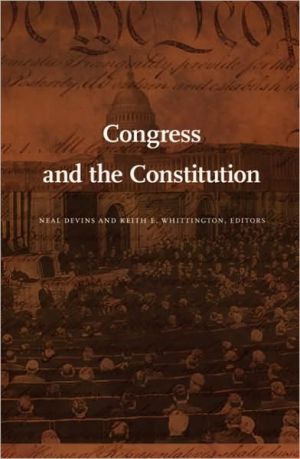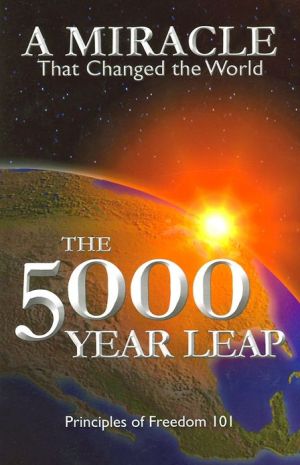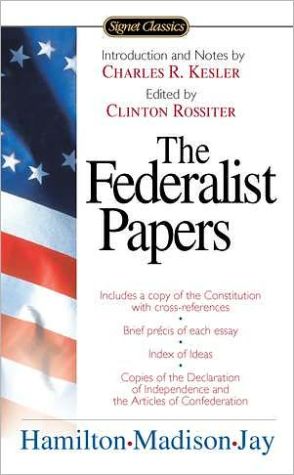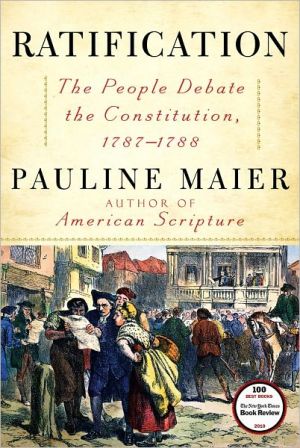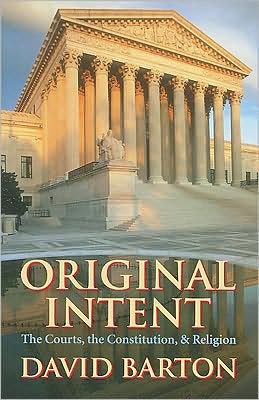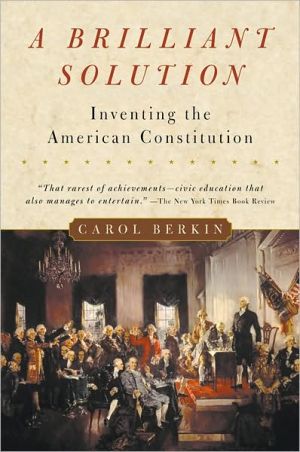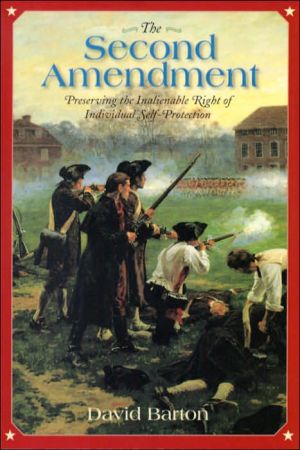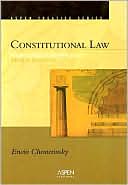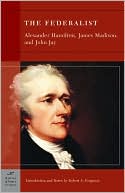Congress and the Constitution
For more than a decade, the U.S. Supreme Court has turned a skeptical eye toward Congress. Distrustful of Congress's capacity to respect constitutional boundaries, the Court has recently overturned federal legislation at a historically unprecedented rate. This intensified judicial scrutiny highlights the need for increased attention to how Congress approaches constitutional issues. In this important collection, leading scholars in law and political science examine the role of Congress in...
Search in google:
Essays contest notion of the absolute preeminence of judicial review in constitutional interpretation, analyzing the role of Congress as a constitutional interpreter and responsible constitutional agent.
Congress and the Constitution\ \ Duke University Press\ Copyright © 2005 Duke University Press\ All right reserved. \ ISBN: 978-0-8223-3612-9 \ \ \ \ Chapter One\ Prolegomena for a Sampler Extrajudicial Interpretation of the Constitution, 1789-1861\ DAVID P. CURRIE\ The subject of this book is the role of Congress in constitutional interpretation. The chapters that follow discuss that subject from a variety of theoretical and institutional perspectives. How do members of Congress view their own constitutional responsibility to the Constitution? What resources are available within the legislative branch to assist Congress in resolving constitutional questions? How can executive agencies help to ensure that Congress has the necessary information to make informed decisions? Is Congress likely to take its constitutional responsibility more seriously in some kinds of cases than in others? To what extent are constitutional questions actually addressed in modern congressional hearings? How can congressional procedures be reformed to improve the conditions for sound constitutional decision making? To what extent can Congress be trusted with constitutional interpretation? How does Congress react to judicial decisions invalidating its handiwork? How does Congress affect constitutional interpretation indirectly through such processesas Senate approval of nominees for federal office, reorganization of agencies, and the prescription of qualifications for appointment? Do some "super-statutes" acquire a "quasi-constitutional" status that adds to the arsenal of fundamental norms against which, in the absence of explicit repeal, later legislation must be measured? Should the degree of deference that courts afford to congressional judgment be tailored to the degree of consideration that Congress actually gave to the constitutional question?\ This chapter is designed as a prolegomenon for what follows. Its aim is to set the stage for the ensuing dissection of current problems by providing an overview of the role of extrajudicial actors in early constitutional interpretation, as illuminated by my study over the past ten years of eighteenth- and nineteenth-century materials.\ I begin with a brief discussion of the theoretical basis for extrajudicial interpretation and proceed to depict, in a general way, what one discovers on reading the early congressional and executive materials. In the modern spirit of verismo, I conclude this prologue with a slice of life, uno squarcio di vita-a brief case study designed to illustrate in somewhat greater detail the general conclusions put forward in this chapter.\ WHO INTERPRETS THE CONSTITUTION?\ Why the courts, of course-first and foremost the Supreme Court of the United States, but other courts as well. Witness the scads of judicial decisions, good and bad, that we all read and almost exclusively assign in courses on constitutional law; witness what is predominantly cited in briefs and oral argument in constitutional litigation; witness the stuff of standard law review articles and treatises on the Constitution.\ Why? As Chief Justice Marshall told us in Marbury v. Madison, the judges all swear to uphold the Constitution; they must not violate it by doing what the Constitution forbids, like trying criminal cases without juries, even if Congress has directed them to do so. But the judges are not alone in this regard. Others swear to uphold the Constitution as well: presidents, cabinet officers, members of Congress-indeed every federal, state, and local officer in the land.\ When we study Marbury v. Madison, we learn that the oath argument is hollow: that an officer swears to do his constitutional duty does not tell us what that duty is. Another part of Marshall's opinion, moreover, seems to suggest that courts may have a special role to play in constitutional interpretation: As Hamilton had said in the Federalist, the courts are an important element in a system of checks and balances designed to keep other branches of government from exceeding constitutional limits on their powers. The Framers, the argument goes, could not have meant for Congress to be ultimate judge of the scope of its own authority; that would smack too much of appointing the rabbit to guard the cabbages.\ Indeed in the early Congress occasional speakers suggested that questions as to the constitutionality of proposed legislation should be left to the courts, but they were quickly shouted down; from the first it was understood that legislative and executive officers had a parallel responsibility to determine in the first instance the extent of their own powers. To paraphrase Marbury, it would indeed have been odd for the Constitution to place limitations on the authority of Congress and direct its members to ignore them, hoping that only the Court would defend them. As Presidents Jefferson and Jackson famously insisted, the Framers established multiple checks to ensure that their handiwork was respected.\ Thus it was not surprising that President Washington took the Constitution for his guide-keenly aware, as he was, that everything he did would establish a precedent and determined to cut square corners with the fundamental law. It was not surprising that Washington vetoed one bill on constitutional grounds and signed the bill creating the Bank of the United States only after soliciting formal opinions from four members of his Cabinet and convincing himself that the bill was constitutional. It was not surprising that when James Madison introduced the Bill of Rights in the House of Representatives in 1789 he said it would speak to the consciences of legislators as well as to their constituents and to the courts. It was not surprising that whenever a bill was introduced in Congress the threshold question was understood to be whether Congress had power to enact it. And thus it was not surprising that Representative Theodore Sedgwick of Massachusetts could say during the First Congress, "the whole business of legislation is a practical construction of the Constitution."\ It is precisely because Congress too has a responsibility to address questions of its own authority that when courts pass on the constitutionality of legislation they often defer to congressional judgment. It would make no sense for them to do so if Congress regularly left such questions to the courts. And it is for the same reason that congressional debates since the beginning have been filled with arguments over the meaning of various constitutional provisions-as are legislative committee reports, presidential messages, and opinions of the attorneys general. These voluminous and readily available materials accordingly provide a copious and fruitful source of information and ideas about the meaning of the Constitution-a source that until rather recently has been strangely neglected by lawyers, judges, and legal scholars.\ HOW COMPREHENSIVE IS THE MATERIAL?\ In the early Congress virtually everything became a constitutional question -from great controversies like those over the national bank and the president's removal power to ephemera of exquisite obscurity. What information, for example, could be demanded in the census? (Only the number of free and unfree inhabitants in each state, which the Constitution made determinative for the apportionment of representatives and direct taxes? No, said Madison, anything that might be relevant to the exercise of any congressional function.) How should the president be addressed? (Someone suggested "His Highness, the President of the United States of America, and Protector of Their Liberties"; others objected that Article II's simple "President of the United States" was meant to be exclusive and that Article I forbade the government to confer titles of nobility.) Was the president at liberty to refuse his salary? (The consensus was no, since a president who impoverished himself would be at the mercy of Congress.) When a president died or was disabled, did the vice president become president or merely assume his powers and duties? (Did it matter? Yes: for if he did assume the office, and the elected president recovered, there would be no way short of impeachment to get rid of him; if he did not assume the office, Congress could destroy his independence by reducing his salary.) Whatever the constitutional conundrum, we are likely to find something about it in the legislative and executive record.\ HOW SIGNIFICANT WAS EARLY EXTRAJUDICIAL INTERPRETATION?\ In the nature of our court system, laws must be passed and executive actions at least imminently threatened before they can be judicially reviewed. It follows that in nearly every case I have considered, Congress and the executive determined the constitutionality of their own actions before the courts did. The legislative or executive decision was not necessarily final, since the judges could review and reverse it-provided that the issue arose in a concrete controversy neither unripe nor moot between adverse parties and was not itself deemed "political." Even if it did, it was generally outside the courts that constitutional issues of federal authority were initially defined and resolved.\ Very few acts of Congress, moreover, were challenged before the courts during the early years, and nearly all of them were upheld. Indeed when the constitutionality of early legislative acts finally reached the courts-often many years after their enactment-the judges tended at best to repeat arguments previously made by executive officers or in Congress. In the case of the Bank of the United States, for instance, Fisher Ames in the House and Alexander Hamilton in the cabinet had anticipated Chief Justice Marshall's entire opinion, in addition to demonstrating what Marshall omitted and the modern observer might be inclined to think crucial: to which congressional powers the bank was necessary and proper and why. Even when the courts ultimately did pass on the constitutionality of federal legislation, congressional and legislative arguments were often more thorough and persuasive.\ Not only did the early Congress almost always interpret the Constitution before the courts did, and not only did it often do a better job; in many cases congressional debates provide our only official discussion of constitutional issues, for many crucial constitutional controversies have never been judicially resolved. Who, for example, has power to terminate a treaty? The Constitution prescribes how treaties are made; it is silent as to how, if at all, they are to be dissolved. Congress abrogated two treaties with France by statute in 1798, unfortunately without much reported argument. (Both statutes and treaties, it would later be said, were the law of the land; and only Congress could repeal a law.) Some sixty years later, after considerable debate, the president and Senate canceled a commercial convention with Denmark. (The authority of the president and Senate to make treaties, it was argued, implied authority to unmake them.) A century after that President Carter purported to annul a treaty with Taiwan without asking the Senate for approval. (The president, his supporters argued, had general authority over foreign affairs, and the requirement of Senate consent did not apply.) In its infinite wisdom, the Supreme Court declined to decide the case; congressional debates remain our best official source on this basic constitutional question.\ Consider also the perennial and much-mooted question of presidential authority to initiate hostilities abroad-one of the fundamental questions, as some saw it, of the Vietnam War. We know a great deal about this issue from legislative and executive sources: from firm pronouncements by Presidents Washington and Jefferson that they could act only in defense, from bitter congressional debates on President Madison's incursion into West Florida and President Polk's military expedition to the Rio Grande, and more recently from the discussion and adoption of the celebrated War Powers Resolution of 1973. The legislative and executive materials on this issue are extraordinarily rich, and I have exposed only the tip of the iceberg; we still have heard almost nothing about it from the courts.\ I think it fair to say that the original understanding of the Constitution was forged not in the courts but in Congress and the executive branch.\ HOW RELEVANT ARE EARLY EXTRAJUDICIAL INTERPRETATIONS TODAY?\ Constitutional questions tend to recur. It is striking how many recent controversies over the meaning of the Constitution were anticipated by legislative and executive discussions that took place a century and a half or two centuries ago. Who counts the electoral votes in a disputed presidential election? What are the standards for impeachment? May states set additional qualifications for members of Congress? May a member of Congress be an officer in the armed-forces reserves? May federal employees be required to surrender their political rights? Is the president subject to judicial process? May Congress impose affirmative duties on state officers?\ All these questions and many more of current importance were raised and debated outside the courts during the early years. Early extrajudicial materials remain an invaluable source of ideas and arguments on innumerable questions that continue to trouble us today. Even when the issue under discussion has no modern counterpart, moreover, the early materials afford valuable insights into the timeless and transcendent question of how one should approach the task of interpreting the Constitution; and it may not surprise you to learn that just about everyone was an originalist back then.\ HOW GOOD WERE THE ARGUMENTS?\ They were variable, of course, like those of the judges. Many members of Congress said nothing at all. Others said only things that were foolish, or pedestrian, or obvious. Sometimes the debates are cloyingly repetitive. At other times important statutes were passed without any significant reported debate, or without any reported debate at all. Reporting was unofficial and spotty in the early days, and until 1795 the Senate worked behind closed doors. Sometimes, it appears, major constitutional questions were simply overlooked.\ There was no reported debate, for example, when Congress in 1793 passed a statute to implement the extradition and fugitive-slave clauses of Article IV, 2. It was not at all obvious, and many would later deny, that Congress had any such authority; for (in conspicuous contrast to the full faith and credit clause of Article IV, 1) neither clause said anything about legislative implementation. Little harm was done, however, for Congress had satisfactorily addressed the same question of implicit enforcement power in the context of the oath requirement of Article VI four years before. In other cases, the failure of Congress to engage in debate or of journalists to record it could result in major embarrassment-as when opponents of federal spending for internal improvements devoted untold hours to attempting to prove that the constitutional basis for the government's takeover of lighthouses and other navigational aids in 1789 was not the commerce clause, as it most plausibly seemed to be.\ On other occasions, however, there was a great deal of first-rate argument. I do not say the debates were generally disinterested, or that the participants were commonly as detached as judges. Especially after the development of political parties in the 1790s, there was often a high degree of congruence between the constitutional views of the speaker and the political result he hoped to achieve; one suspects that in many a case it was the conclusion that compelled the argument, not the other way around.\ But the same is at least equally true of advocates for parties before the courts, who nevertheless often produce arguments of the highest caliber. Political payoff, like a litigant's retainer, can provide a powerful incentive to good argument. The congressional and executive records sparkle with brilliant insights about the meaning of constitutional provisions. Even today it is often difficult to find constitutional arguments of substance that were not made a century or two ago by some executive officer or member of Congress. In the debates of 1798 over the Sedition Act, for example, George Nicholas and Albert Gallatin, with a remarkable economy of words, developed our whole modern theory of freedom of the press, to which nothing but the icing has been added in the ensuing two hundred years.\ (Continues...)\ \ \ \ \ Excerpted from Congress and the Constitution Copyright © 2005 by Duke University Press. Excerpted by permission.\ All rights reserved. No part of this excerpt may be reproduced or reprinted without permission in writing from the publisher.\ Excerpts are provided by Dial-A-Book Inc. solely for the personal use of visitors to this web site. \ \
Introduction1Prolegomena for a sampler : extrajudicial interpretation of the Constitution, 1789-186118Congressional attitudes toward constitutional interpretation39Constitutional analysis by congressional staff agencies64Hearing about the Constitution in congressional committees87The federal appointments process as constitutional interpretation110Lawyers in Congress131Congressional responses to judicial review151Court, Congress, and civil rights173Quasi-constitutional law : the rise of super-statutes198Congressional fact finding and the scope of judicial review220Institutional design of a Thayerian Congress242Evaluating Congressional constitutional interpretation : some criteria and two informal case studies269Can Congress be trusted with the Constitution? : the effects of incentives and procedures293
\ From the Publisher“Congress and the Constitution is a timely and provocative book on whether, when, and how Congress thinks about the meaning of the Constitution. The excellent scholarship in this volume raises deep questions about the relationship between Congress and the courts in interpreting the Constitution and sets an agenda for further work in this important area. In so doing, the book makes a significant contribution.”—Elena Kagan, Dean of Harvard Law School\ “The subject of this collection—the treatment of the Constitution by legislators in Congress—is both extremely interesting and important, and I do not believe that there is any other single book that is so effective in bringing together a wide range of relevant materials.”—Sanford Levinson, author of Wrestling with Diversity\ \ \
